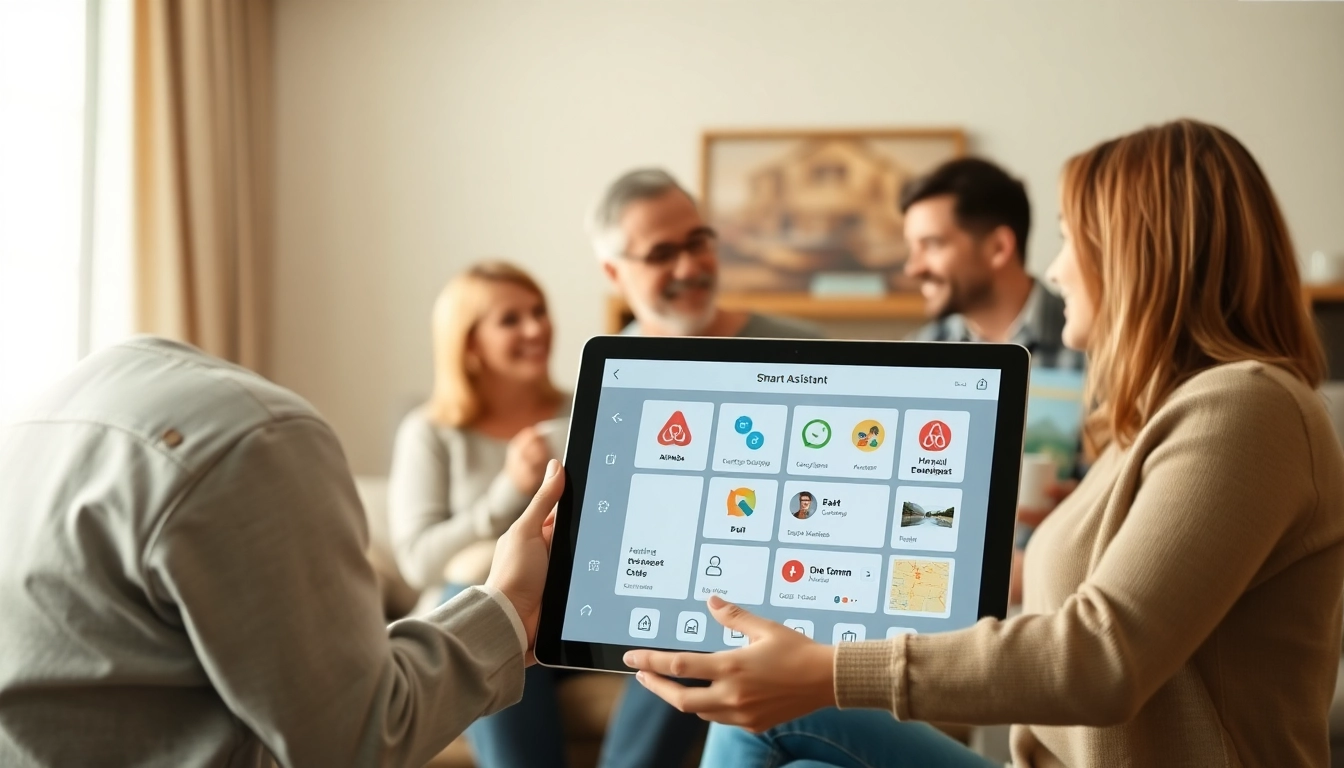Understanding the Airbnb Smart Assistant
What is an Airbnb Smart Assistant?
The Airbnb smart assistant is a cutting-edge tool designed to enhance the experience of both hosts and guests within the Airbnb ecosystem. As the hospitality industry increasingly leverages technology to improve service delivery, this assistant serves as a virtual concierge, providing seamless interactions and support. It utilizes artificial intelligence and machine learning algorithms to streamline communication, manage bookings, and optimize guest experiences, making it an indispensable resource in today’s competitive market.
Essentially, the Airbnb smart assistant functions as a digital mediator that not only addresses common queries from guests but also empowers hosts to manage their properties efficiently. From automating responses to inquiries about amenities to scheduling cleaning services, this tool is tailored to meet the evolving demands of travelers and property owners alike. For those interested, an extensive overview of the functionality can be found here: Airbnb smart assistant.
Key Features of Airbnb Smart Assistants
The key features of the Airbnb smart assistant contribute significantly to enhancing both the hosting and guest experiences. Here are some of the most vital functionalities:
- Automated Messaging: The assistant can automatically respond to inquiries, provide check-in instructions, and share local recommendations, ensuring guests feel welcomed and informed even before they arrive.
- Booking Management: It helps hosts track and manage reservations, cancellations, and changes in real-time, reducing administrative burdens considerably.
- Personalized Communication: Using data-driven insights, the assistant can tailor responses based on guest preferences and past interactions, which enhances the personal touch.
- Feedback Collection: The tool can gather guest feedback easily, providing hosts with insights to improve service and experiences.
- Integration with Smart Devices: The Airbnb smart assistant can integrate with home automation systems, allowing hosts to control lights, temperature, and security remotely, adding a layer of convenience for both hosts and guests.
Benefits for Hosts and Guests
The adoption of the Airbnb smart assistant brings a multitude of benefits for both hosts and guests, facilitating a smoother and more enjoyable experience.
- Increased Efficiency: For hosts, the assistant streamlines operations such as booking management and communication, freeing up time to focus on other aspects of property management.
- Enhanced Guest Experience: Guests receive timely responses to their queries, personalized recommendations, and assistance throughout their stay, which increases overall satisfaction.
- Higher Occupancy Rates: With effective communication and management, hosts can reduce cancellation rates and keep their calendars full year-round.
- Data-Driven Insights: The smart assistant provides valuable analytics on customer preferences and behaviors that can help hosts tailor their offerings better.
- 24/7 Availability: The assistant is available at all times, ensuring that guests can get the help they need, regardless of time zone differences.
How to Integrate the Airbnb Smart Assistant
Steps for Setup and Configuration
Integrating the Airbnb smart assistant into your property management system is a structured process, ensuring that you can fully leverage its capabilities. Here’s how you can set it up:
- Choose Your Platform: Start by selecting an appropriate smart assistant that fits your hosting needs and integrates seamlessly with Airbnb.
- Create an Account: Register for the service and create an account. Most platforms will require basic information about your property and hosting practices.
- Customization: Customize the assistant by inputting specific details about your property, including check-in times, house rules, and amenities.
- Integrate with Booking System: Connect the smart assistant to your existing booking management system to ensure automatic synchronization of reservations.
- Set Up Automated Messages: Create templates for common inquiries and set triggers for when these messages should be sent, enhancing communication efficiency.
- Test Functionality: Conduct tests by making inquiries and reviewing system responses to ensure that everything operates smoothly.
- Launch and Monitor: Finally, launch the smart assistant, continually monitoring its performance, and make adjustments based on guest feedback and interaction analytics.
Optimizing Performance for Maximum Efficiency
Once the Airbnb smart assistant is set up, optimizing its performance is crucial for maximizing efficiency and guest satisfaction. Here are strategies to consider:
- Regular Updates: Keep the assistant updated with the latest information regarding your property, local events, and amenities to ensure that guests receive the most accurate recommendations.
- Monitoring Interaction Analytics: Use analytics tools to assess guest interactions with the assistant, identifying common questions and areas for improvement.
- Training the Assistant: Continually train the assistant on new FAQs and updates in your property management processes to enhance its capabilities over time.
- Guest Engagement Strategies: Foster ongoing engagement with guests through personalized messages that promote local attractions, restaurants, and activities to enhance their experience.
Common Integration Challenges and Solutions
While integrating the Airbnb smart assistant can offer substantial benefits, several challenges may arise. Here are some common issues and corresponding solutions:
- Technical Glitches: Sometimes, the integration might lead to software bugs or communication issues. Regularly updating the software and consulting tech support can resolve these problems.
- User Resistance: Hosts may be hesitant to rely on technology for communication. Providing training and showing the benefits can dispel fears and encourage adoption.
- Data Privacy Concerns: Some guests may be apprehensive about sharing personal information. Clear communication about data handling practices and compliance with privacy regulations can alleviate these concerns.
Enhancing Guest Interaction with Airbnb Smart Assistants
Personalized Recommendations for Guests
One of the standout features of the Airbnb smart assistant is its ability to provide personalized recommendations. By examining guests’ previous interactions, preferences, and inquiries, the assistant can offer tailored suggestions for local attractions, dining options, and experiences. For example, if a guest frequently asks about vegan restaurants, the assistant can prioritize those options in its recommendations, creating a customized experience that delights the guest.
This level of personalization not only enhances guest satisfaction but also drives engagement, encouraging guests to explore the area and engage more with local businesses, creating a win-win situation for both the visitor and the host.
Real-time Assistance and Support
Real-time support through the Airbnb smart assistant is a game-changer for both hosts and guests. The ability to assist guests instantly with check-in instructions, directions, or answers to common questions is invaluable. Guests can receive immediate help without having to wait for a host’s response, creating a seamless experience that fosters trust and satisfaction.
Moreover, this capability allows hosts to manage multiple properties effectively without compromising on service quality, as the assistant can handle many interactions simultaneously, ensuring that all guests feel cared for and valued.
Collecting Feedback Through Smart Assistants
Utilizing the Airbnb smart assistant to collect guest feedback can significantly enhance property management practices. The assistant can prompt guests at various stages of their stay to share their experiences and suggestions. This feedback is crucial, as it can guide hosts in implementing necessary improvements and adjustments.
Furthermore, analyzing this data allows hosts to identify trends and areas needing attention, enabling them to enhance the overall guest experience. Continuous improvement based on feedback fosters a culture of hospitality that can set a property apart in a competitive market.
Measuring the Impact of the Airbnb Smart Assistant
Key Performance Indicators (KPIs) to Track
To evaluate the success of the Airbnb smart assistant, it’s essential to track relevant key performance indicators (KPIs). Here are several critical metrics to consider:
- Response Time: Measure the average time it takes for the assistant to respond to guest inquiries. Quick response times can indicate high efficiency.
- Guest Satisfaction Rates: Monitor satisfaction through ratings and reviews, focusing on comments related to communication and assistance.
- Occupancy Rates: Track changes in occupancy rates following the introduction of the assistant to assess its impact on booking activity.
- Feedback Collection Rates: Analyze how many guests engage with feedback requests sent via the assistant.
- Repeat Booking Rates: Assess whether guests who interact with the assistant tend to return for subsequent stays, indicating high satisfaction and loyalty.
Analyzing Guest Satisfaction Scores
Tracking and analyzing guest satisfaction scores provides invaluable insights into how well the Airbnb smart assistant performs. Use post-stay surveys or follow-up messages via the assistant to gather these scores. Look for correlation patterns between scores and specific interactions with the assistant, identifying strengths to build upon and weaknesses to address.
By understanding these dynamics, hosts can adjust their strategies, improve operations, and ensure higher satisfaction levels moving forward.
Improvement Areas Based on Data Insights
Once data insights are collected and analyzed, actionable improvements can be implemented. For instance, if feedback indicates guests are struggling with check-in procedures, the host can enhance the messaging clarity or streamline the process. Regularly reviewing performance data means that properties can adapt to changing guest needs, trends, and preferences, ensuring that the Airbnb smart assistant remains a valuable tool.
Future Trends for Airbnb Smart Assistants
Emerging Technologies in Property Management
The future of property management through the lens of Airbnb smart assistants lies in the integration of emerging technologies. Innovations such as voice activation, advanced natural language processing, and predictive analytics will redefine how hosts and guests interact. As smart home technologies advance, these assistants may also incorporate more profound integration with home automation systems, enabling automatic settings adjustments based on guest preferences and behavior.
Guest Expectations and Technology Advances
As technology evolves, guest expectations will continue to rise, influencing the development of smart assistants. Future guests might expect multi-lingual support, more personalized experiences, and even AI-driven conversation capabilities. Hosts will need to stay ahead by regularly updating their smart assistant functionalities to cater to these evolving expectations and ensure satisfaction.
Preparing for the Future of Hospitality
To remain competitive in the ever-evolving landscape of hospitality, property managers and hosts must prepare for the future by embracing technology. The Airbnb smart assistant will play an increasingly critical role, guiding hosts through customer engagement, operational efficiency, and guest satisfaction management. Anticipating trends and adapting accordingly will position hosts favorably, ensuring they can meet and exceed the demands of the modern traveler.



